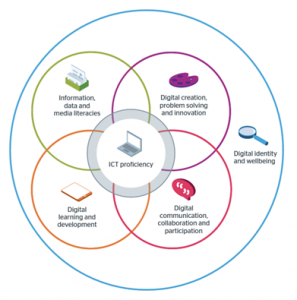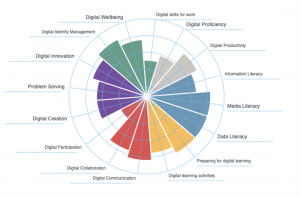Written by Amy Preston, Student Digital Champion

Why are digital skills important in the workplace?
Now that we are emerging from a 2-year pandemic, many companies are moving back towards hybrid or in-person working. However, you’d still be hard pushed to find a job description that doesn’t have digital skills on their list of requirements. Even non-technical and non-office-based jobs require some degree of digital literacy. Recent surveys exhibited on the government website have shown that essential digital skills (things like communicating, handling information and online safety) are required across low, medium and high-skilled occupations. And competency in Microsoft Office is generally required for entry into medium and high-skilled jobs (which graduates typically join). However, it’s not just basic digital skills students need to be thinking about – different jobs require different specialist technological skills, which future employees need to think about when trying to boost their CV. For example, specific requirements for a job as a patent attorney will be notably different to one in marketing – one may require knowledge of online safety and privacy, whereas the other will emphasize creativity.
What are the JISC digital capabilities and JISC discovery?
Because digital skills and employability go hand-in-hand, you may want to look at JISC’s six elements of digital capabilities below. These are the key digital skills looked for by employers, and very important for students (future employees!) to be aware of. Or, take a look at the reimagined JISC framework in the form of the Digital Capabilities Tree by the Student Digital Champions and DEO (Digital Education Office). A good way to find areas that you need to focus on is the JISC discovery tool, which provides a questionnaire on your digital capabilities. This will generate a report and give you ways to improve, with links to useful resources. It’s great for assessing how you can improve your digital capabilities as a student, and as it applies to jobs too, implementing these techniques now is how you will stand out as a digitally skilled candidate to employers!

How can I make my digital skills stand out when applying for jobs?
If you know you are interested in certain jobs after you graduate, scope out adverts for them on LinkedIn, Indeed or other job listing websites to see whether they list any specific digital skill requirements for their jobs. As mentioned above, you will often see they ask for proficiency in Microsoft Office. Find how you can showcase your proficiency – for example, you may have taken the ICDL (or ECDL) exam in school, which is highly regarded by employers looking for Microsoft Office proficiency. But more importantly, consider what specific digital skills you have that match the job requirements and how you can gain skills that you don’t already have. For example, if a job wants some coding experience, there are plenty of resources available to help you. ‘Learn Python the Hard Way’ is a great free resource to use as an introduction to Python coding. Use your digital skills to do some digging and find online resources to help you gain specific expertise that will make you stand out!
Finally, be aware of your online identity when applying to jobs. The first ‘Digitally Skilled’ video talks about what online identity is and how you can shape it. Have a look and see if there are ways that you can adjust it to improve your employability – this is an important skill in itself!

Further resources
If you need further help with job applications, head to the Careers Service website for information on employability and bookable workshops such as CV writing and interview skills. Also look at the DEO’s resources and other DigiTalk blog posts for all things digital! Finally, best of luck in securing a job with your new and improved digital skills!

